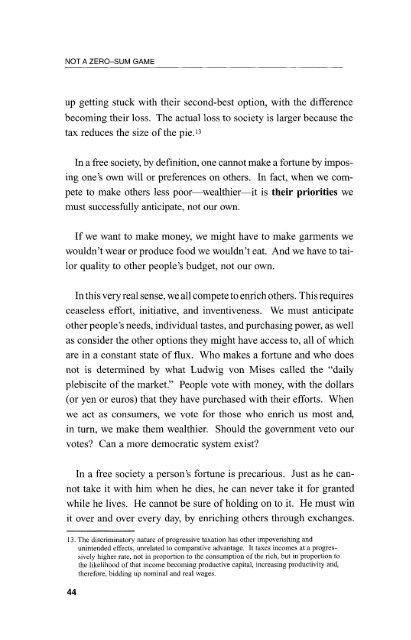Not a Zero-Sum Game - Ludwig von Mises Institute
Not a Zero-Sum Game - Ludwig von Mises Institute
Not a Zero-Sum Game - Ludwig von Mises Institute
You also want an ePaper? Increase the reach of your titles
YUMPU automatically turns print PDFs into web optimized ePapers that Google loves.
NOT A ZERO-SUM GAME<br />
up getting stuck with their second-best option, with the difference<br />
becoming their loss. The actual loss to society is larger because the<br />
tax reduces the size of the pie.13<br />
In a free society, by definition, one cannot make a fortune by impos-<br />
ing one's own will or preferences on others. In fact, when we com-<br />
pete to make others less poor-wealthier-it is their priorities we<br />
must successfully anticipate, not our own.<br />
If we want to make money, we might have to make garments we<br />
wouldn't wear or produce food we wouldn't eat. And we have to tai-<br />
lor quality to other people's budget, not our own.<br />
In this very real sense, we all compete to enrich others. This requires<br />
ceaseless effort, initiative, and inventiveness. We must anticipate<br />
other people's needs, individual tastes, and purchasing power, as well<br />
as consider the other options they might have access to, all of which<br />
are in a constant state of flux. Who makes a fortune and who does<br />
not is determined by what <strong>Ludwig</strong> <strong>von</strong> <strong>Mises</strong> called the "daily<br />
plebiscite of the market." People vote with money, with the dollars<br />
(or yen or euros) that they have purchased with their efforts. When<br />
we act as consumers, we vote for those who enrich us most and,<br />
in turn, we make them wealthier. Should the government veto our<br />
votes? Can a more democratic system exist?<br />
In a free society a person's fortune is precarious. Just as he can-<br />
not take it with him when he dies, he can never take it for granted<br />
while he lives. He cannot be sure of holding on to it. He must win<br />
it over and over every day, by enriching others through exchanges.<br />
13. The discriminatory nature of progressive taxation has other impoverishing and<br />
unintended effects, unrelated to comparative advantage. It taxes incomes at a progres-<br />
sively higher rate, not in proportion to the consumption of the rich, but in proportion to<br />
the likelihood of that income becoming productive capital, increasing productivity and<br />
therefore, bidding up nominal and real wages.

















